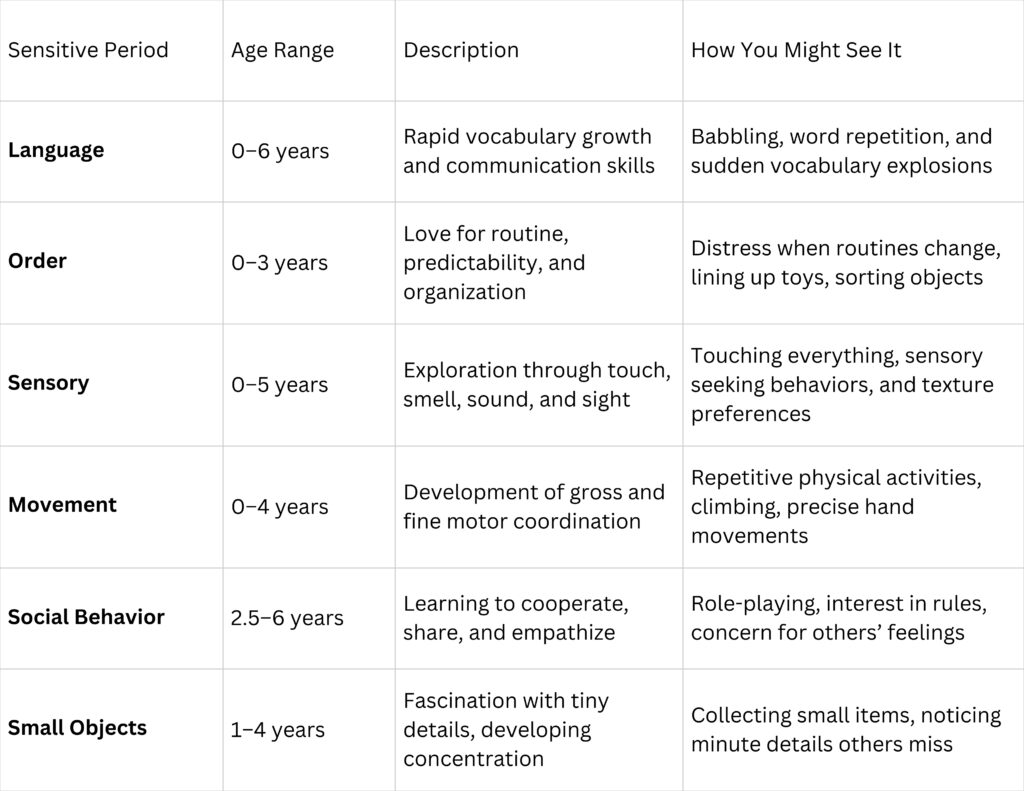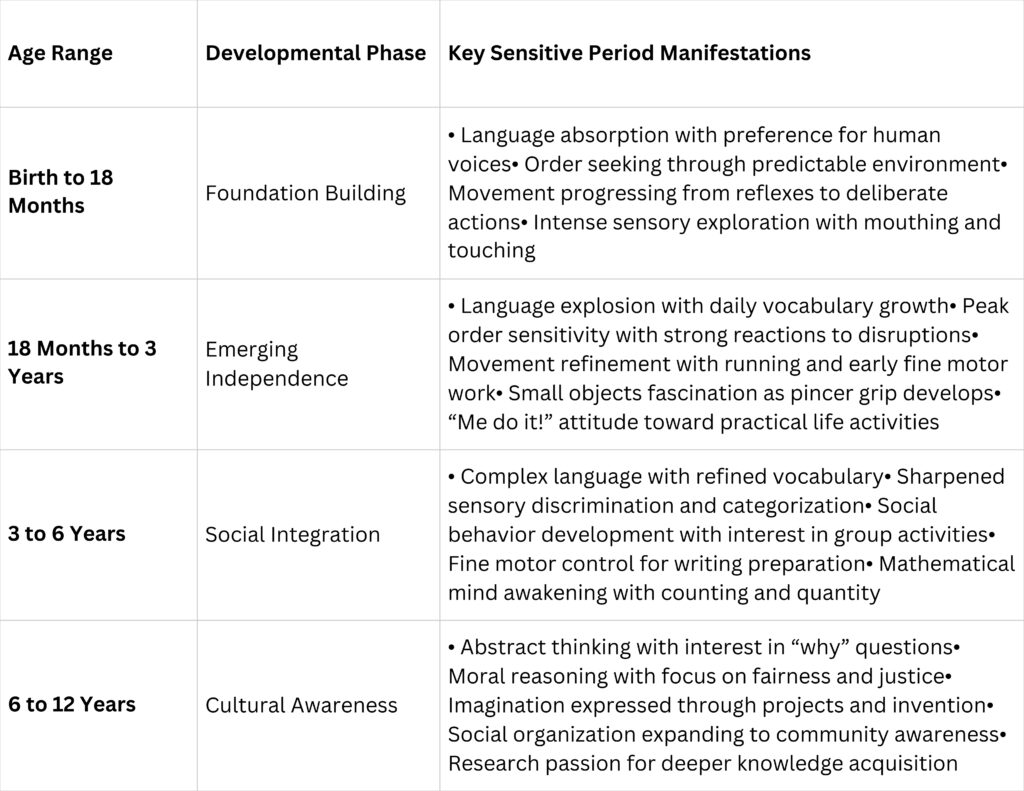The Essential Secret That Can Transform Every Parent’s Life.
Discover how to recognize and support your child’s sensitive periods—those magical windows when learning specific skills happens naturally and joyfully, according to Montessori principles.
Picture this: Your toddler refuses to let you help with their jacket, insisting, “I do it myself!” Or perhaps your preschooler spends an hour arranging rocks by size, completely absorbed in the task. 🤔
Have you noticed these moments of intense focus in your child? These aren’t just cute moments or testing behaviors—they’re windows into your child’s developmental journey. These are sensitive periods—powerful learning windows described by Dr. Maria Montessori that, when understood, can transform how you support your child’s natural growth.“The most important period of life is not the age of university studies, but the first one, the period from birth to age six.” — Maria Montessori
Supporting your child during these sensitive periods helps them thrive with less frustration and more joy. This guide shows you how to spot these special developmental windows and create the perfect environment for your little one’s blossoming mind. 🌱
What Exactly Are Sensitive Periods in Child Development?
Sensitive periods are times when a child is especially receptive and motivated to learn specific skills. These natural windows open and close on their own timeline and, with proper support, lead to deep, joyful learning experiences.
Have you ever watched your child repeat the same activity dozens of times with complete satisfaction? That’s a sensitive period in action!
Quick Check: Is Your Child in a Sensitive Period Right Now?
- Do they seem obsessed with a particular type of activity?
- Are they practicing something specific repeatedly without getting bored?
- Do they resist interruptions when engaged in certain tasks?
If you answered yes to any of these, your child is likely experiencing a sensitive period!
The 6 Key Sensitive Periods Every Parent Should Know

Your challenge: Observe your child for 15 minutes today. Which sensitive period behaviors do you notice? Keep a small notebook handy to jot down your observations!
How the Montessori Approach Perfectly Supports These Natural Learning Windows
Dr. Montessori’s genius was recognizing that children naturally gravitate toward activities that support their current developmental needs. In authentic Montessori environments:
- Prepared Environment: Create spaces that support sensitive periods
- Appropriate Materials: Offer tools that match the child’s age and interests
- Freedom With Limits: Allow child-directed work and uninterrupted concentration
Ask yourself: How could you apply one element of this Montessori flow in your home environment this week?
Spotting Your Child’s Current Sensitive Period: A Parent’s Guide
Signs That Reveal Active Sensitive Periods:
- Repetition: Your child performs the same activity over and over with joy
- Concentration: They show unusual focus and resistance to interruption
- Persistence: They try repeatedly, even when facing challenges
- Satisfaction: A visible sense of fulfillment after completing the activity
Let’s bring this to life with a real example:
Four-year-old Emma spent every morning for three weeks arranging her toy animals by size, color, and type. Her parents recognized this as the sensitive period for order and provided labeled bins and small trays to support this natural interest. Within a month, Emma was independently organizing not just her toys but also helping with household classification tasks!
Age-Related Trends in Sensitive Periods

Remember that these windows don’t suddenly close but gradually transition as the child builds competence. The foundations established during each sensitive period continue to support lifelong development. 🌱
Quick action step: What phase is your child in right now? Take 5 minutes to list three ways you could support their current developmental needs based on this chart.
Remember: Every Child Is Uniquely Wired
Children follow their own developmental timeline, influenced by both nature and nurture:
- Varied intensity: Some children show intense focus during sensitive periods (like sorting objects for hours), while others express interest more subtly
- Different durations: A sensitive period that lasts 6 months for one child might extend to 18 months for another
- Overlapping windows: Many children experience multiple sensitive periods simultaneously, prioritizing different ones at different times
- Environmental factors: Exposure to certain experiences may trigger or enhance specific sensitive periods
- Temperament affects expression: Introverted children might work quietly during sensitive periods, while extroverted children may seek more interaction
Question for reflection: How does your child’s unique personality influence how their sensitive periods manifest?
Creating a Home Environment That Nurtures Sensitive Periods
Transform your home into a space that supports your child’s developmental windows with these practical steps:
For Language Development (0-6 years)
- Read aloud daily, using rich vocabulary and expressive tones
- Narrate your actions during everyday routines: “I’m slicing the apple into six equal pieces.”
- Introduce language materials like alphabet puzzles and simple phonetic cards
- Pro tip: Record your child’s new words in a journal—you’ll be amazed at the progression!
For Order Lovers (0-3 years)
- Create consistent daily routines with visual schedules
- Organize toys in transparent bins with picture labels
- Keep spaces uncluttered with “a place for everything.”
- Try this today: Establish a consistent goodbye ritual for separations to build security
For Sensory Explorers (0-5 years)
- Create texture baskets with fabric swatches, natural materials, and safe household items
- Offer scent jars with spices, herbs, and natural fragrances
- Provide safe food exploration opportunities with different tastes and textures
- Weekend project: Make a simple sensory bin with dried beans, measuring cups, and funnels
For Movement Enthusiasts (0-4 years)
- Create safe climbing opportunities both indoors and out
- Offer threading activities, tongs for transferring objects, and pouring stations
- Minimize restrictive equipment like bouncers that limit natural movement
- Daily habit: Allow extra time for self-dressing without rushing
For Social Development (2.5-6 years)
- Facilitate small playdates with minimal adult intervention
- Role-play social scenarios like greeting others or asking to join in play
- Read books featuring friendship themes and discuss emotions
- Conversation starter: “How do you think your friend felt when…?”
What If You Miss a Sensitive Period?
If you’re just learning about sensitive periods and worry you might have missed important windows, take a deep breath—it’s never too late to support your child’s development.
- Development continues: While sensitive periods represent optimal learning windows, children continue developing skills outside these periods, too
- Adapt your approach: If a sensitive period has passed, skills can still be learned with more structured guidance and practice
- Follow current interests: Focus on the sensitive periods your child is experiencing now, rather than worrying about what’s passed
- Trust the process: Children are remarkably resilient—providing a supportive environment at any stage yields benefits
Remember, parenting isn’t about perfection. Your awareness and responsiveness now are what matter most. 💫
The Balancing Act: Supporting Without Interfering
One of the most challenging aspects of honoring sensitive periods is knowing when to step back:
- Observe before acting: Watch for at least 30 seconds before offering help
- Provide minimal necessary aid: “Help me do it myself” is the Montessori motto
- Respect concentration: Avoid interrupting a focused child
- Prepare, then step back: Set up opportunities, then allow independent exploration
- Value process over product: The learning happens in the doing, not in the result
“Never help a child with a task at which he feels he can succeed.” — Maria Montessori
Try this technique: Next time your child struggles with something, count silently to 10 before offering assistance. You might be surprised by their problem-solving abilities!
Conclusion: Your Role as a Developmental Guide
Supporting sensitive periods is about tuning in, not taking over. With patience, careful observation, and a prepared environment, you’ll watch your child grow confidently and joyfully. The Montessori approach isn’t just about education—it’s about honoring your child’s natural development path.
You’re not just a parent—you’re your child’s first and most powerful guide. 💛
Next Steps on Your Montessori Journey:
- Start a sensitive period journal this week to track your child’s intense interests
- Choose one area of your home to adapt based on your child’s current sensitive period
- Join a local Montessori parent group or online community to share observations and ideas
- Schedule 15 minutes daily of uninterrupted observation time—just watching your child at play can reveal so much
The most beautiful gift we can give our children is our presence and understanding as they unfold into the people they’re meant to become.
Download our free “Sensitive Periods Observation Journal” printable to start tracking your child’s developmental windows today!
Did you find this guide helpful? Share it with another parent who might benefit!
Related Articles:
